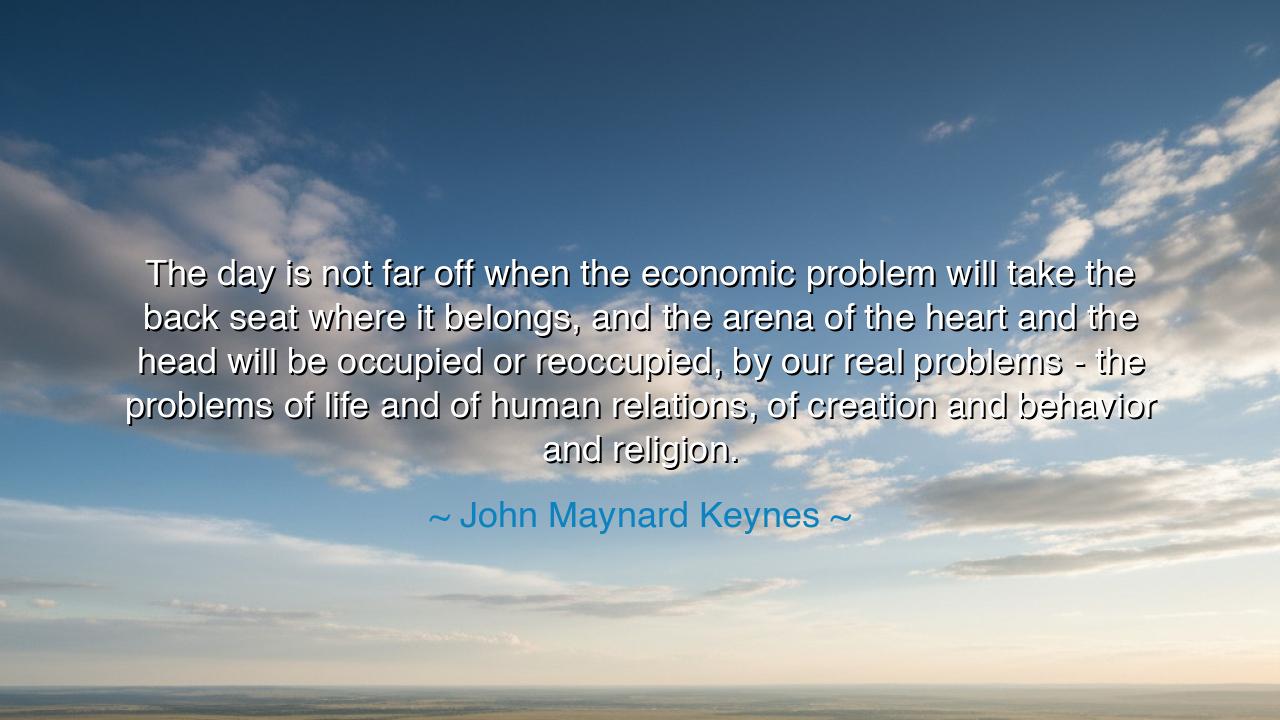
The day is not far off when the economic problem will take the
The day is not far off when the economic problem will take the back seat where it belongs, and the arena of the heart and the head will be occupied or reoccupied, by our real problems - the problems of life and of human relations, of creation and behavior and religion.






When John Maynard Keynes, the great seer of modern economics, spoke the words: “The day is not far off when the economic problem will take the back seat where it belongs, and the arena of the heart and the head will be occupied or reoccupied by our real problems — the problems of life and of human relations, of creation and behavior and religion,” he was not merely forecasting the future of wealth — he was envisioning the destiny of mankind. His words shimmer like prophecy, reminding us that the purpose of prosperity is not accumulation, but awakening; not endless production, but the rediscovery of the human spirit.
Keynes, who lived through the Great Depression and the two World Wars, saw the torment of nations obsessed with money and survival. He was a man of reason and intellect, yet his heart longed for something beyond the marketplace — for a civilization where economics served humanity, and not the other way around. To him, the true goal of progress was to free mankind from the chains of necessity so that we might turn our gaze toward higher pursuits: art, wisdom, compassion, and the search for meaning. His vision was not only economic but profoundly moral and spiritual — that once hunger and poverty were conquered, the soul of man must face its truer battles: how to live, how to love, how to create, and how to coexist.
In the centuries before Keynes, the great thinkers — from Aristotle to Confucius — spoke of wealth as a means, never as an end. They knew that abundance without virtue leads only to corruption of the soul. Aristotle called it oikonomia, the stewardship of the household — not the endless hunger for more, but the wise management of what one has for the good of all. Keynes, standing at the dawn of the modern industrial age, sought to remind a world blinded by machines and markets that once the economic problem was solved, humanity’s greater purpose must resume. “We shall once more value ends above means,” he wrote elsewhere, “and prefer the good to the useful.”
Consider the life of Albert Schweitzer, physician, philosopher, and musician. At the height of his career, he turned away from acclaim and comfort to serve the sick and forgotten in Africa. His decision puzzled the world — how could a man of such genius choose hardship over glory? Yet Schweitzer lived Keynes’s vision. Freed by education and stability from the “economic problem,” he turned his heart toward reverence for life — the realm of the moral, the creative, and the divine. His work healed not only bodies but the conscience of an age too enamored with progress. His life testified that once the belly is full, the soul must be fed — or else civilization starves inwardly.
Keynes’s warning still rings through our modern world, for though we have achieved abundance beyond the dreams of his time, the problems of life and human relations remain unsolved. Our machines grow wiser, but our hearts grow weary. Our cities glitter, but our spirits wander. We have learned to produce without limit, but not to live with purpose. The economic problem has indeed receded for some — yet the higher problems he spoke of have risen in its place: loneliness in a connected world, division in a global family, anxiety amid abundance. Keynes foresaw that these would be the real struggles of the future — not survival, but significance.
The lesson he left us is simple yet profound: do not let wealth or comfort become the measure of success. When your material needs are met, turn your strength toward the inner work — toward kindness, art, service, reflection, and spiritual growth. The world does not need more accumulation; it needs more understanding. The economy must serve life, not consume it. To be rich in possessions but poor in compassion is to have conquered the body and lost the soul.
Therefore, let the wise remember: when the “economic problem” finally bows to human ingenuity, do not stop there. For beyond that victory lies the true battlefield — the arena of the heart and the head. There we must contend with pride and prejudice, greed and apathy, faith and doubt. It is in that sacred space that the destiny of mankind will be decided — not in the marketplace, but in the human heart. And when that day comes, as Keynes foresaw, we shall rise again as creators, dreamers, and caretakers of the divine gift called life.
So go forth and labor not only for bread, but for meaning. Build not only wealth, but wisdom. And when your hands have finished their work, let your spirit begin its own — to heal, to understand, and to love. For that, and not gold or power, is the truest fulfillment of the human mission.






AAdministratorAdministrator
Welcome, honored guests. Please leave a comment, we will respond soon